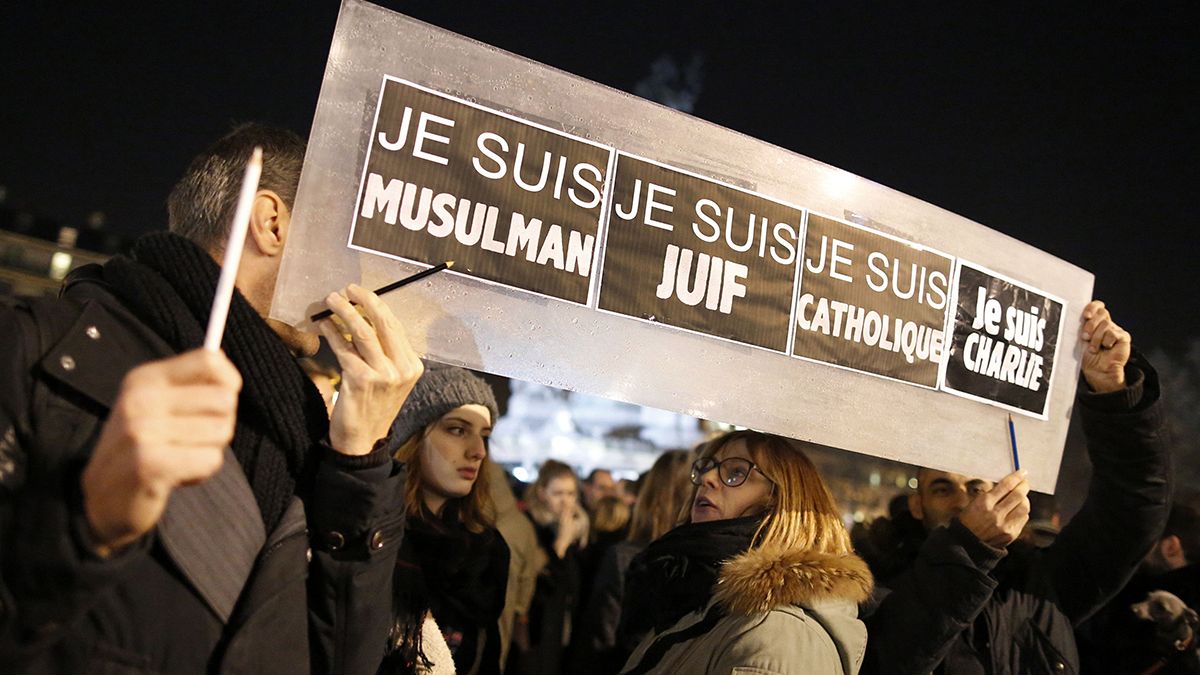Muslim organisations in France and around the world condemn Paris terror attacks
Muslim organisations in France and around the world have condemned the massacre at the Charlie Hebdo magazine and the other attacks in Paris.
The message is clear: the terrorists have no right to claim they are carrying out their atrocities in the name of Islam or the Prophet Mohammed.
Muslim groups are voicing concern about a possible backlash.
And there is a rising call for more to be done to stop the radicalisation of vulnerable and easily-led young people.
The Imam of Drancy in Paris, Hassen Chalghoumi, told euronews: “Why are they (the terrorists) using our young people? These are French youth fighting their own country. They’ve gone to fight (as jihadists) in Mali and now they’re in Syria and elsewhere. Everyone has to face their responsibilities, and civil society, politicians, judges, they are not doing enough to crack down on this.”
The French government agrees. And it is appealing for the country not to fall into what the terrorists are attempting to achieve: division and stigmatisation.
Anti-Muslim Attacks in France after the Charlie Hebdo Tragedy pic.twitter.com/0t3osTrjUD
— ian bremmer (@ianbremmer) January 10, 2015
Euronews’ Isabelle Kumar spoke to a leading figure of Islamic thought, Tariq Ramadan, a professor of contemporary Islamic studies at Oxford University.
Isabelle Kumar: “Quite simply, why did these young guys go out and kill?”
Tariq Ramadan: “I think there are many reasons, and the first one, of course, is the way they understand Islam or the way they were taught Islam, in a way which is a binary vision. And it is what we hear coming from Syria and Iraq and some violent extremist groups, (who) are saying Muslims are right so all the other people are wrong and then we are oppressed by the West, France, or by the USA, the West as a whole, and then there is a wrong understanding.”
Isabelle Kumar: “Some are also pointing to a failure in the integration process in France.”
Tariq Ramadan: “No, I don’ t think as a whole it has to do with integration. I think the great, great, great majority of French Muslims, European Muslims, are part of the society. And look at the reactions – it is just a complete consensus coming from all the communities in the West condemning what happened. I think it is very marginal and has nothing to do with the long process. In historical terms the fact that Muslims are now part of the Western and the European society is a fact and we have to avoid coming back every time with the same question.”
Isabelle Kumar: “Is France an increasingly racist country in your opinion?”
Tariq Ramadan: “No, I think generalising such statements is completely wrong. France is not racist even though we have racists in France.”
Isabelle Kumar: “You live in Britain at the moment. How do you see the difference in the two countries, is there a difference in the way they treat their Muslim communities?”
Tariq Ramadan: “What we have is a transnational reality now that we can see in Germany, in Belgium in France even in Britain with the rise of the UKIP party that is stigmatising the immigrants and Muslims, saying Islam is alien to the European continent. My position is to say exactly the opposite: Islam is a European religion, it is a western religion and we have to deal with it, we are going to build our future together.”
Isabelle Kumar: “Do you think it’s one of the objectives of the terrorists to create this division, to create this Islamophobia and thus engender more radicalisation?”
Tariq Ramadan: “What they want is to nurture this Islamophobia, to nurture this sense of alienation and frustration. This is why we have to stand, this is what I am saying to the Muslims around the world. Do exactly the opposite of what psychologically you would do, which is don’t isolate yourself, don’t be on the margins, come into the mainstream, be visible, be vocal, be the voice of the voiceless, of the silent majority that are all against what is happening.”
Isabelle Kumar: “Is Islam being interpreted in an increasingly violent way? There is a very frightening strand of the religion that is developing. Do you think that is here to stay?”
Tariq Ramadan: “I think we don’t know what could happen. This is once again very marginal compared to the huge majority of the Muslims.”
Isabelle Kumar: “But it’s growing…”
Tariq Ramadan: “It’s growing, but it’s still very marginal. You know 90 per cent of my time I am coming to the media (to explain) what Islam is not. I am not invited to say what Islam is, what the values are, what is the spirituality that we are sharing. I am always put on the defensive: tell me why you are not a danger? Why don’t you want me to tell you why I am an added value in this society, to which I can bring something. The perception of Muslims in the West is always either you are apologetic or you are on the defensive. We have to stop this way of talking to ourselves, because at the end of the day I am a Westerner like you and I am a Muslim part of the future.”
